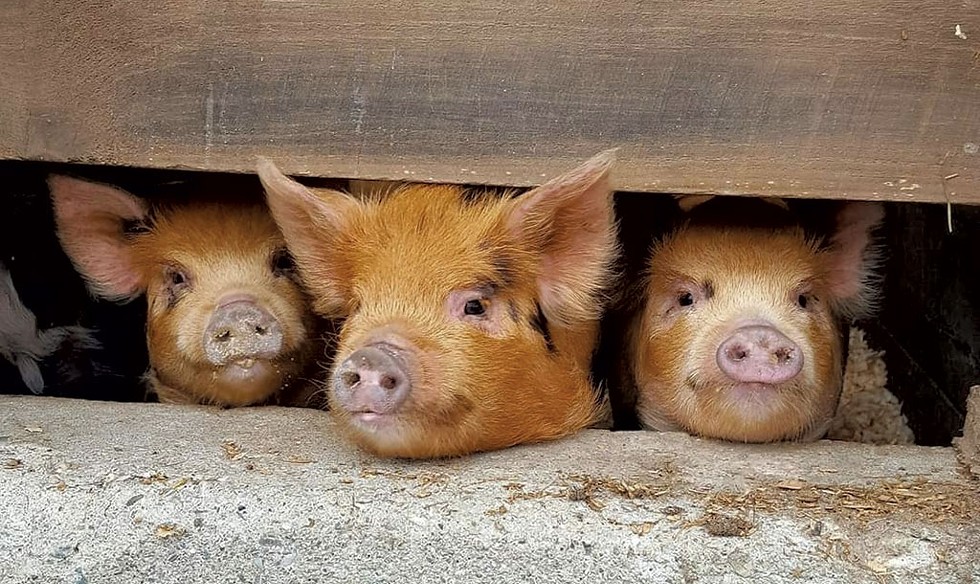
- Courtesy
- Pigs at Kinder Way Farm Sanctuary in West Pawlet
Cute, fuzzy baby animals are an adorable sign of spring. The ugly truth? At some point, many of these animals are likely headed to the slaughterhouse.
That is, unless a place like Kinder Way Farm Sanctuary in West Pawlet will take them. The 125-acre nonprofit farm-animal sanctuary helps animals who are elderly and have special needs — one of just six such facilities in Vermont. It's a labor of love run by Erika and Mark Gutel, a married couple who have overcome many challenges to help these animals enjoy retirement.
The critters come from all over; on a February day at the farm, Erika and Mark led a visitor into a noisy barn just off Route 22. "Sorry for the chaos," Erika said. "Fred's just arrived."
Fred, an energetic sheep, was the newest member of Kinder Way's rescue family; he came from a farm that could no longer care for him. "He was scheduled for slaughter," Erika explained, though she added that she didn't know much else about his history. It didn't matter. Fred was already family.
A goat bashed her head against the pen where Fred would stay for a few days until the other animals could get used to him. Welcoming or bullying? "Both," Erika said with a laugh. "She's making sure the new kid knows his place."
Like Fred, the Gutels came from somewhere else — Colorado. They relocated here in 2016, but their lives have been upended by a series of disasters, including the pandemic and a violent storm. The West Pawlet location, once known as Liebig Berries, is actually their third Vermont home. Last year, they moved their 100 farm animals, five dogs and three kids with help from the Pomerleau Family Foundation.
This year, they hope to make enough money selling berries and growing niche crops to offset their expenses. It costs $40,000 a year just to feed the animals, not to mention vet bills and building maintenance. Mark works full time for the Addison County Sheriff's Department and fills in part time with the Fair Haven Police Department as the animal control officer.
"Oh, it's not easy," Mark said, laughing, as he bent down to pet a pig. As he did, more pigs began to rambunctiously vie for his attention like a litter of giant puppies. "But where would these guys be without us? It keeps me going. So, we always find a way."
A kinder way to live
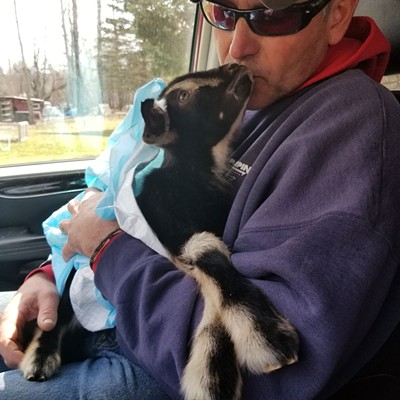
- Courtesy
- Mark Gutel with a goat
Sitting in the kitchen, Mark, 54, explained that he grew up on a farm in Illinois and never planned to live on one again.
A self-described jack-of-all-trades, he's held a number of jobs, from furniture mover to truck driver. When he met Erika, now 48, he was managing a feed store in Littleton, Colo.
Erika, a New Jersey native, was working as an intensive care unit technician at the Littleton Equine Medical Center; she would come to Mark's store to buy grain and supplies for horses in the hospital. The two flirted frequently, and one night when they ran into each other outside of work, Mark asked her out.
"And we haven't spent a day apart since," he said fondly.
Erika had always dreamed of being a farmer, and she won Mark over. They started a farm in Colorado with a handful of Jersey cows and delivered raw milk to customers. They also raised chickens, turkeys and pigs for meat, but it took an emotional toll on them.
"We felt so sad killing these animals," Mark said.
They decided to care for their remaining animals rather than slaughter them. People heard about what they were doing and started asking the couple to take their animals, too.
Mark and Erika began rescuing and caring for cats, horses, pigs, goats, sheep, cows, geese, ducks, chickens and "pretty much any animal that needed help," Mark said.
Erika started to dream again. She saw a picture of a farm for sale in Benson, Vt. She printed it out and put it on the fridge, saying she hoped to live there someday. It inspired them to keep working and saving their money. Finally, in December 2016, they moved their family across the country.
They named their new farm sanctuary Kinder Way because "there has to be a kinder way to live and exist," Mark said.
It's been quite a journey since. In the beginning of 2020, they were asked to help with a case of animal hoarding in Brandon involving 400 animals. At the time, they assessed their situation and thought they could take on the extra expense. In addition to operating the animal sanctuary, they also ran a coffee shop in Castleton, at the Amtrak station near what was then Castleton University.
"Business was great," Erika said — until the pandemic shut everything down.
The couple got creative. They rented out campsites on the farm and hosted weddings, concerts and school field trips. Mark started attending the police academy to develop another source of income, but it wasn't enough to keep the farm.
They sold it at a good price but couldn't afford to buy another one that could house their animals. "We reached out in desperation on social media, and one of the teachers who brought her class to the farm for a field trip responded," Erika said. She let them rent the guesthouse on her family farm in Middlebury and use their 60 acres.
Kinder Way moved there in April 2022. "We built all the structures to house the animals, the fencing, and built a yurt to bring in a side income to support the animals," Erika said. Unfortunately, that December, a bomb cyclone swept through the property with winds over 100 mph. No animals were harmed, but it destroyed all of their buildings.
"The community was amazing and helped us pick up the pieces again," Erika said. "But we knew we had to start searching for our new forever home" — preferably one that would come with another source of income. They purchased Liebig Berries last July.
Just as the Gutels finished telling their story, Erika's phone chimed with a text message.
Erika laughed, holding up her phone: "Someone wants to know if we can take in their turkey."
Berry good potential
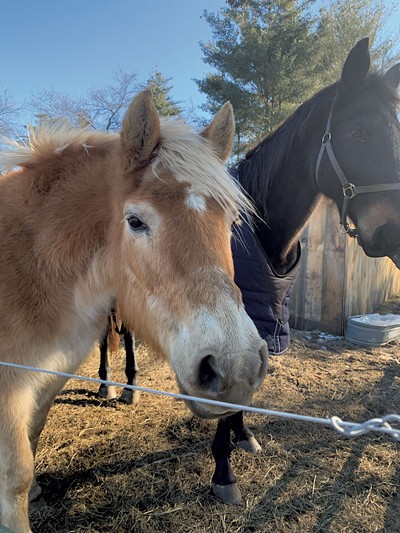
- Courtesy
- Horses at Kinder Way Farm Sanctuary in West Pawlet
Now Erika spends her days with the animals. After dropping her kids off at school — two are in high school, one is in first grade — she "makes the rounds," she said, checking in on each animal, seeing how they're doing, and making sure they get grain and hay.
"Except these guys, they're high-maintenance," she said, reaching up to pet one of three elderly horses. Two of the three are more than 30 years old and toothless, so they get a special soaked mash twice a day. Erika grew up with horses, both riding and showing them in competitions, and it's her love for these big animals that inspired her to train to be a vet tech in the first place.
In the afternoon, Erika picks up the kids from school, then finishes work on the farm. When Mark gets home, he helps out, too, though he can get called away at any time to deal with animal issues elsewhere.
It sounds chaotic, but the couple envision an even busier summer at Kinder Way Farm once berry season kicks in.
They got a taste of that last year. "We closed on the farm and opened for blueberries a week later," Erika said. "Honestly, it was the most fun we've ever had." But with planning, they know it can be more profitable. There are 31 rows of blueberries on the property, and they only managed to harvest a third of them between hosting "you-pick" customers and selling the berries at farmers markets.
"The blueberries were great, and we saw potential there, but because we weren't prepared, we lost out on about $100,000," Mark lamented. On the bright side, he added, they fed a lot of birds and rabbits with their unpicked crop. The Gutels always seem to find a silver lining.
They're inventive, too. Through a path in the woods, there's a small yurt on the farm, overlooking a pond. It took a few tries to shove the door open, frozen shut by the February ice, but the inside was cozy with a woodstove, flannel blankets and a full-size bed. They plan to rent out this little "slice of paradise" to visitors.
"It's the best in the summer," Erika said. "It gets so green out here, and it's totally hidden and private. It's so peaceful."
Playing in the mud
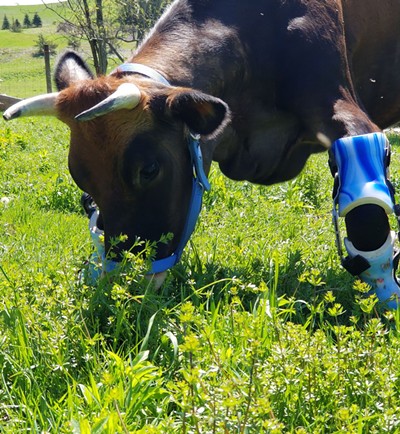
- Courtesy
- A cow at Kinder Way Farm Sanctuary in West Pawlet
Mark's perfect day on Kinder Way Farm is rolling around in the mud with the pigs. When he got to the pen on our tour of the barn, he hopped right in without hesitation. "There's my boy. That's my good boy," he said, rubbing the bristles behind the pigs' ears as they snorted at him.
The pigs are Kunekunes and came from the Brandon hoarding case Kinder Way helped with in 2020. They're partially blind and a little deaf, too. Mark pointed out Josh, Archie and Sid, his favorite.
"He's the ugliest thing you've ever seen, but he's so handsome," Mark said, beaming with pride. Sid looked up, shiny eyes peeking out beneath flaps of skin and bristly hair, and almost seemed to smile back.
The pigpen is where Mark goes when things get stressful. He hangs out in the mud, where he can sit, think and feel at peace. Pigs are smart, he said, and can sense emotions. "Sid will literally console me," Mark explained with an amused laugh. "He's basically my best friend."
Sid's empathy is needed often — costs are mounting. The Gutels have had a rough few years following the pandemic, and a lot of the animals they take in have neurological damage or disabilities and need expensive vet care.
To make ends meet, Kinder Way solicits donations. The couple have had a lot of help from the Pomerleau family, and they have a small but devoted base of Patreon donors. With both of them working all day, Mark said, they don't have time to actively recruit more, although Erika posts on their Instagram account as regularly as she can.
"I'm trying to reach out more, because we really need help to continue to do what we do," she said.
That includes feeding and caring for Fred the sheep. Many of the goats crowded around the new arrival, baaing and bleating, while he settled into the corner on a blanket, paying little attention.
"You know, Fred's cool. I like Fred," Mark commented, watching as a goat headbutted the pen again, trying to get the new kid's attention. "Yeah, I think he's going to fit right in here with our crazy, happy family."
Join the Cause
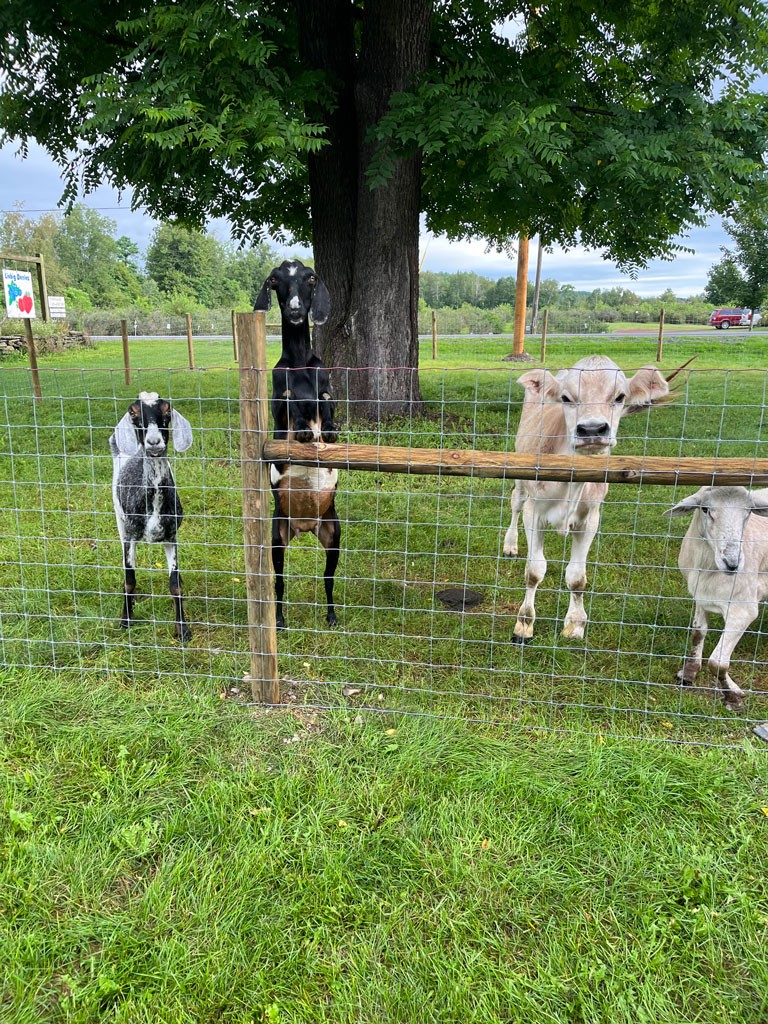
- Courtesy
- Goats and cows at Kinder Way Farm Sanctuary in West Pawlet
Help the Kinder Way Farm Sanctuary by making a tax-deductible donation at kinder-way-sanctuary.org or join Kinder Way's Patreon to give regularly. All donations go toward veterinary care, feed and bedding for the animals; improving and building infrastructure for animal housing; repairing and building fencing for existing and future pasture areas; and helping more animals in need. Follow the sanctuary on Instagram @kinderwayberryfarmandsanctuary.
